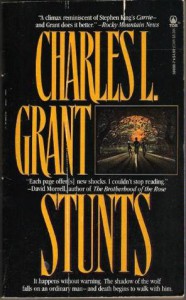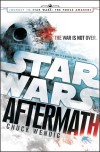Stunts
 Despite the evidence presented in my last five reviews, I'm not really on a 1980s horror kick. Yes, I'm making my way through Charles L. Grant's works, but that's a side project to my other reading. Now that I've finished up my Unfinished Series project, I pick my next read randomly from a spreadsheet; Necroscope and Stunts were pulled out using a random number generator, and it's just happenstance that they happened to be of the same genre. (Though, now that I think back on what I've been reading, maybe there's something more sinister behind these "random" selections . . . ?)
Despite the evidence presented in my last five reviews, I'm not really on a 1980s horror kick. Yes, I'm making my way through Charles L. Grant's works, but that's a side project to my other reading. Now that I've finished up my Unfinished Series project, I pick my next read randomly from a spreadsheet; Necroscope and Stunts were pulled out using a random number generator, and it's just happenstance that they happened to be of the same genre. (Though, now that I think back on what I've been reading, maybe there's something more sinister behind these "random" selections . . . ?)Anyway, Stunts is an odd novel namely because there are two distinct stories here which are only tangentially related. One of the stories is described on the back of the book -- teenagers in a New England town want to pull pranks around Halloween. That's also the relevance of the title (they're called "stunts", not pranks), which makes it even odder that this part of the novel doesn't even begin until past page 100. Up until that point, I was convinced I was reading a different book that had somehow had the wrong cover attached at the printer, since it was focused on an American professor in England trying to figure out what's going on with his friend, who appears to be causing murders all over the town. After the next 100 pages or so, the story begins flip-flopping between the two stories, and. . .
Honestly, I'm not sure what's going on with the two different stories. They don't really go together at all. Grant had a habit of publishing books which were collections of four novellas that were somewhat related, and I wonder if Stunts was his attempt to take two diverse stories and try to make a complete story out of them. I can't really say he succeeded; they reminded me a bit of the two stories taking place in House of Leaves, especially when one of the two stories (the one about the stunts) wound up being far more interesting than the other. By the end of the story, he forces them together, and they just don't feel like they belong.
Also missing from this novel was Grant's atmosphere, which has lent so much to his previous stories. The story reads more like a traditional novel, and had more of a plot and pacing than his previous books have had, but it seems like he sacrificed what made him a distinctive writer in order to pull that off. It's weird, because I found myself liking the more traditional style even as I missed Grant's quiet horror. And even then, the story wasn't "loud" horror; it just didn't have that same level of eeriness and otherworldliness that defined his earlier work.
It was also a bit disconcerting to read a Grant book that wasn't set in Oxrun Station, since I've read all of those back-to-back. Whenever Grant jumped back to New England, I expected to read something about the library, or one of the Stocktons, or Williamston Pike, and it was always a little jarring to realize that I was somewhere new. This isn't a fault of the novel, really, since it had more to do with my reading habits than anything else, but I had gotten so accustomed to Oxrun Station that I kept expecting to find those references.
Now that I think about it, though, I wonder if the non-Oxrun Station books are intended to be a different style all together. I jumped ahead through Grant's chronology to finish out the Oxrun Station books, and so far that's all I've read of his entire body of work. Stunts was the first book outside of that series I read, so I don't know how his earlier non-Oxrun Station books compare. Now that I'm finished with those and moving on to his other earlier books, I should be able to make a better comparison.
I'm not sure if I would recommend this novel, even to folks who are fans of Grant. Not only is his style missing, but the book is also missing a strong conclusion. In his previous books, where the feel of the novel was more important than the story, it didn't matter that much, but here Grant pushes the plot to the forefront while missing out on bringing it to a close. I enjoyed reading it, but I'm not sure that I liked where it went in the end. In fact, by the time the story ended, it would have just been getting started in a more traditional, plot-driven story. Grant's open-ended conclusions from previous books just don't work in this case.






